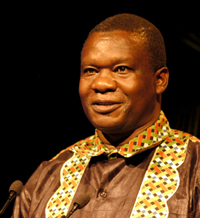Interview with Henry Manani
WHAT ARE YOU DOING NOW AND HOW DID YOU GET THERE?
 Co-ordinating the National Centre for Early Childhood Education (NACECE) in Kenya. The centre founded in 1984 has the following functions which I oversee.
Co-ordinating the National Centre for Early Childhood Education (NACECE) in Kenya. The centre founded in 1984 has the following functions which I oversee.
• To develop training programmes for ECD personnel to train trainers of trainers in ECD
• To develop and disseminate curriculum for ECD programmes
• To co-ordinate and liaise with internal and external partners in ECD
• To identify, design, undertake and co-ordinate research in ECD
• To monitor and evaluate ECD programmes and projects
• To develop programmes to cater for the local development of children under 8 years of age.
• To develop and provide resource materials for parental and community education
• To offer services to agencies involved in ECD
• To encourage new initiatives, approaches and alternatives to child development
For the last 20 years, I have climbed up the ladder while working with children in various positions at NACECE, and determination, commitment, hard work and above all love for children has made me to be what I am.
PREDICT THE FUTURE FOR EARLY CHILDHOOD EDUCATION IN THE NEXT 10 YEARS.
| "...dealing with children is like a vocation, like priesthood, you do not get there for money, you have to be committed and have inherent love for children." |
WHAT IS THE MOST SIGNIFICANT CHANGE COMING? WHAT STAYS THE SAME?
The most significant change coming is that many countries will develop ECDE policies and legal frameworks and that will make implementation of ECDE activities easier. Parental involvement in ECE activities may not change much but will remain the same since parents will still be expected to contribute to ECE programmes especially in the care for under 3’s. Thus whether or not governments take up added responsibilities for ECE, parents will continue doing what they have always done – caring for their children.
WHAT WOULD YOU SAY TO A STUDENT WHO WAS CONSIDERING CHOOSING ECE OR ADVOCACY AS A FIELD OF STUDY AND A CAREER?
A student considering choosing ECE or advocacy as a field of study or career needs to first remember that dealing with children is like a vocation, like priesthood, you do not get there for money you have to be committed and have inherent love for children.
WHAT SPECIFICALLY WOULD YOU SAY TO SOMEONE WHO IS INTERESTED IN BECOMING AN EARLY CHILDHOOD ADMINISTRATOR?
Someone interested in becoming an administrator needs to know that ECE is about networking. It is cross-cutting and to be effective, one has to go out of his or her way and engage all partners with a stake in ECD for effective service delivery.
WHAT HAS BEEN THE MOST SATISFYING PART OF YOUR CAREER?
The most satisfying part of my career has been the development of children’s folklore materials in 26 Kenya’s ethnic languages out of 42, having seen ECE develop from a humble beginning to now a national programme with structures of training programmes for ECD teachers, trainers and ECD centre committee leaders. Having initiated the Islamic Integrated Education Progrramme which is now respected internationally, having developed ECD structures for training from the national to grassroot levels.
ARE THERE MORE THREATS TO CHILDREN THAN THERE USED TO BE WHEN YOU STARTED YOUR CAREER? ARE THERE MORE OPPORTUNITIES?
There are more threats today facing children, especially in Africa, the threat of HIV and AIDS is real. So many children have been left as orphans with little or no care provided to them. There is also more moral degradation and fewer role models. Problems of poverty, unemployment have made many children lose hope or interest in education and it is not easy to motivate them. However opportunities exist in that the world has become a global village. People can come together at short notice and address problems facing children and the needy in general for instance during the Tsunami tragedy. People can also share ideas easily through the web.
WHAT IS YOUR FAVORITE COLOR?
Sky blue is my favourite colour – sign of calmness and tranquility, peace and life.
IF YOU WERE AN ANIMAL, WHAT WOULD IT BE?
A horse, so powerful with a lot of energy to be able to respond more to the many needs of children wherever they are.
RELATE A STORY FROM CHILDHOOD THAT MADE A SIGNIFICANT IMPRESSION ON YOU?
Once upon a time there was a mother and her daughter. Famine struck the country – no food. The mother went away to look for food. On retuning she ate the food alone. The child was not amused with this action. The child left home and came back with food and ate as the mother watched. The mother started crying. What a sorry state.
Teaching: Need each other, assist each other, feel for each other.
HOW DID YOU SELECT YOUR PROFESSIONAL CAREER?
By seeing the many children issues that needed to be acted upon in my own rural home.
WHAT HAS BEEN THE MOST GRATIFYING MOMENT IN YOUR CAREER?
The most gratifying moment in my career has been seeing ECE become a national programme and put as one of the functions of the Ministry of Education. Also having a well established National Centre for Early Childhood Education at the Kenya Institute of Education not only serving Kenya but the Africa region and attracted interest worldwide for capacity building.
WHAT KEEPS YOU GOING THROUGH DIFFICULT PATCHES?
My love for children and resolve to always do the right thing no matter the consequences keep me going through difficult patches.
WHAT BRIEF MESSAGE WOULD YOU LIKE TO PROVIDE TO ExchangeEveryDay READERS?
To be closer to children is to be closer to God.
Interview conducted and contributed by Michael Kalinowski